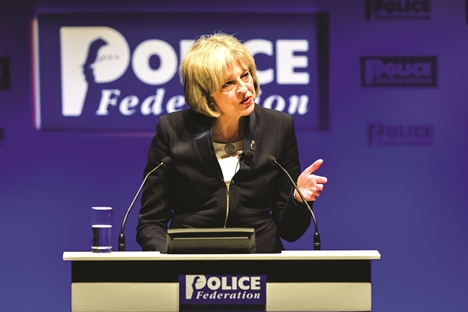13.10.15
Police reform: The changing relationship between police forces and local government in England and Wales
Source: PSE - Oct/Nov 2015
Barry Loveday, reader in criminal justice administration at Portsmouth University, considers the changing power-relations between police chief and elected PCCs; the impact of the Winsor Report; Labour’s failed blueprint; and the introduction of elected mayors to run the new city-regions in England and Wales.
The success in the 2015 general election of the Conservative Party has renewed its commitment to further devolution of responsibilities of the police (and other services) to local authorities. This ongoing commitment was first formulated in the debut report of the London-based think tank Policy Exchange, ‘Going Local. Who should run Britain’s Police?’, in 2003. That report argued that local delivery of police services along with local accountability should be the central feature of contemporary policing, and that this might be buttressed by the direct election of ‘policing commissioners’, who would replace local police authorities. Interestingly, this commitment has been sustained – as public statements by the home secretary have clearly demonstrated.
Thus, in response to police leaders’ recent demands for the amalgamation of police forces at the 2015 Superintendents Annual Conference, the home secretary reaffirmed her commitment to local delivery of services. She also highlighted the evident problems arising within Police Scotland as a potential example of what can go wrong within large police agencies.
Change in power relationship
It would be fair to say the introduction of police and crime commissioners (PCCs) and their election in 2012 left a great deal to be desired. Yet the evidence to date suggests the arrival of PCCs did much to rebalance the power relationship between police and local government. The first evidence of this was in Avon & Somerset, where the chief constable’s contract – much to his surprise – was not extended for a further two years. He was told to reapply for his job, which in HR terms is tantamount to being shown the door. He lost his later appeal in court, whose ruling unquestionably served to highlight the very significant powers given to PCCs relating to hiring (and firing) chief officers within the Police Reform and Social Responsibility Act 2011.
Soon afterwards, another event hit the headlines, involving the chief constable of Gwent and the PCC. In response to (among other things) an internal memorandum informing her officers that the only channel of communication with the PCC would be through the chief constable, the PCC questioned the chief officer’s competence and the general efficiency of the Gwent police under her command. What quickly became a direct confrontation between the parties ended with the early retirement of the chief constable.
The subsequent early retirement of the chief constable of Northumbria this year, and the suspension of yet another chief constable, Nick Gargan, also at Avon & Somerset, have collectively demonstrated how parlous the position of chief constable has now become.
This is in remarkable contrast to what went before. Not that long ago it was almost impossible to remove even the most unpopular chief constable, given the almost automatic protection offered to these officers by the home secretary, which inevitably overrode local opposition.
Yet as has become very clear, Theresa May has relinquished any residual responsibility for protecting members of the National Police Chiefs Council (NPCC, formerly ACPO).
Additionally, it is apparent that PCCs have been encouraged to develop a principal-agent relationship with their chief officers.
Police authorities were often viewed as merely agents of chief officers, but the new system makes it very plain that the chief constable is now the ‘agent’ of the PCC.

The Winsor Report (2011)
These developments have proved something of a surprise to both chief officers and other ranks, who have been hit by the Winsor Report and its wide-ranging recommendations on police pay and conditions and also finance. The report represents almost a frontal attack on many of the gains negotiated by the Police Federation over the last 30 years.
If that were not enough, the police service has also, for the first time in decades, been included in severe spending cuts along with the rest of the public sector. Now, in response to further potential 20%-plus cuts to police spending, the NPCC has asked the government to allow the introduction of compulsory severance of sworn officers. While the Police Federation has stated that this proposal would be “fought all the way”, the current anomaly pertaining to the overprotection of police officers is now largely indefensible.
The inability of chief officers to remove police officers led in the last phase of cuts to almost the entire removal of civilian support (and other staff) who do not enjoy the job protection accorded to accredited officers. This situation cannot be sustained and it is likely that the home secretary will be ready and willing to accede to the NPCC request to encourage chief officers to establish a more flexible workforce.
Labour’s rejected 2015 blueprint for the police service
Prior to the 2015 general election Labour launched its own strategy for police reform. It largely reflected the recommendations made in the Independent Stevens’ Report on Policing (2013). In its approach, however, the strategy looked whole-heartedly backwards rather than forwards. Based largely on a professional policing model, Labour’s plans included the abolition of PCCs, the amalgamation of police forces to create large regional police forces and the creation of ‘police boards’, whose members would be selected by way of indirect election.
Going backwards would also, of course, have re-established the primacy of chief constables by recreating (in enlarged form) the weak and limited structure of accountability associated with that failed governance model. Nor did there appear to be, even within the Labour party, any consistency in terms of the limited future accorded to PCCs. This was because Labour PCCs had an altogether different perception of the value of this office.
In an enlightening 2014 Fabian Report, ‘Letting in the Light’, Labour PCCs were to identify the benefits of this form of governance. These ranged from the speed of executive decision making through to the identification of challenges to local policing that a PCC could help to resolve.
The latter issue was highlighted in a report prepared by the PCC for Staffordshire. The first detailed activity analysis by the PCC of the force’s officers discovered that close to 20% of total police time was spent responding to mental health problems arising in the community.
It argued that trained personnel in mental care and not the police (untrained to deal with much of this) should deal with this problem at the police station. Such was its impact, the home secretary recommended the creation of demonstration sites to test its feasibility. All of this led Labour PCCs to argue that the office of PCC represented a significant improvement on the largely ineffective work of earlier police authorities.

Elected mayors: deal or no deal?
In immediate contrast to the retroactive stance adopted by Labour on future police governance, the Conservatives proved to be ahead of the game. In line with its commitment to devolving powers away from the centre down to local authorities, the Conservatives have pushed for even greater devolution of major service responsibilities to the local level. This will be linked to the introduction of directly elected mayors in the first instance, to major (northern) cities. Based on the apparent local district support for the ‘Greater Manchester Model’, the new proposals will see future city-regions taking responsibility for (among other things) transport, housing, planning and public health.
Elected mayors will also take responsibility for policing as PCCs relinquish their powers in the city-regions. This development could prove to be of great value for both local communities and police forces as the police service is once again integrated into local government service delivery. After four decades of relative autonomy, where the police service sought to isolate itself from local government by espousing the need for ‘operational independence’, it will finally be required to coalesce with other local (city) services. This was probably a merger that chief officers did not foresee but following the revelations of the Hillsborough inquiry, it could not but be expected.
Yet the very speed with which the quite dramatic proposals for local government reform have been agreed remain almost breathtaking. Based on a statement from the chancellor, that in return for increased devolution he would not settle for anything less than the introduction of directly-elected mayors, all of the northern cities that had earlier openly rejected them have now effectively signed up to introduce them. They consider the financial and other gains promised by the chancellor to be of such a size and nature as to warrant support of a major change in governance.
It might be thought that, faced with the potential loss of billions of pounds, the planned city-regions have, in effect, accepted the chancellor’s ‘inducement’. There is little doubt either that in the planned combined authority areas, a similar imperative will pertain.
The introduction of unitary authorities and city-regions looks back, of course, to the Redcliffe-Maud Commission on Local Government in England (1969), which deliberated for three years. Under the direction of the current chancellor, this process has been undertaken in around three weeks.
As yet, it is difficult to assess the long-term implications of city-regions. They are, however, very likely to impinge on the current boundaries of many police forces, particularly those in the hinterland of larger cities within city-regions. Pressures on smaller forces are, as with Warwickshire and North Yorkshire, likely to be intense as the planned region takes in swathes of smaller police force boundaries.
Moreover, it is not clear whether some city-regions can be expected to replicate the consensus achieved with the Greater Manchester model – for example, the proposed Bristol city-region, or that in the West Midlands. Here, the title ‘Greater Birmingham’ city-region has already been rejected outright by the participating districts.
Conclusion
Remarkably, given the potential reduction in their numbers, neither PCCs (nor their national association) appear to have been included in the devolution consultation process. This may perhaps only reflect the speed of a process which is itself Treasury-driven.
Yet it is surprising that this novel form of police governance, the brainchild of the Conservative-led coalition, should be overlooked – particularly when many PCCs will still be around post-reform within the proposed combined authority areas.
Just as significantly, perhaps, police forces and the NPCC have not been fully engaged in this process either. Future police force boundaries will therefore be determined politically rather than on the basis of considered professional judgement or a reflection of potential improvements in police efficiency and effectiveness.
Tell us what you think – have your say below or email [email protected]